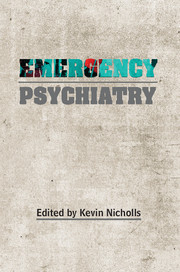Book contents
- Frontmatter
- Contents
- List of contributors
- Acknowledgements
- Preface
- 1 Assessment of suicide risk
- 2 Violence and aggression
- 3 Substance misuse emergencies
- 4 Alcohol and psychiatric emergencies
- 5 Acute psychosis
- 6 Acute side-effects of psychotropic medication
- 7 Emergencies in child and adolescent psychiatry
- 8 The psychiatric intensive care unit
- 9 Safeguarding
- 10 Emergency electroconvulsive therapy
- 11 Life-threatening medical emergencies in a mental health unit
- 12 Emergencies in intellectual disability psychiatry
- 13 Emergencies in older persons’ psychiatry
- 14 Perinatal psychiatric emergencies
- 15 Civilian and military psychological trauma
- 16 Emergencies in liaison psychiatry
- 17 Psychiatric emergencies in deaf people
- 18 Mental health law
- 19 Self-poisoning: aspects of assessment and initial care
- Index
6 - Acute side-effects of psychotropic medication
Published online by Cambridge University Press: 01 January 2018
- Frontmatter
- Contents
- List of contributors
- Acknowledgements
- Preface
- 1 Assessment of suicide risk
- 2 Violence and aggression
- 3 Substance misuse emergencies
- 4 Alcohol and psychiatric emergencies
- 5 Acute psychosis
- 6 Acute side-effects of psychotropic medication
- 7 Emergencies in child and adolescent psychiatry
- 8 The psychiatric intensive care unit
- 9 Safeguarding
- 10 Emergency electroconvulsive therapy
- 11 Life-threatening medical emergencies in a mental health unit
- 12 Emergencies in intellectual disability psychiatry
- 13 Emergencies in older persons’ psychiatry
- 14 Perinatal psychiatric emergencies
- 15 Civilian and military psychological trauma
- 16 Emergencies in liaison psychiatry
- 17 Psychiatric emergencies in deaf people
- 18 Mental health law
- 19 Self-poisoning: aspects of assessment and initial care
- Index
Summary
The modern era of psychopharmacology began in the 1950s, with the discovery of chlorpromazine. It gave new hope to those affected by mental illness and the use of other treatments such as leucotomy and insulin shock therapy declined. Drugs for a wide variety of psychiatric conditions were subsequently developed. However, the use of psychotropics is not without problems. In this chapter, we will examine common side-effects as well as some of the serious and potentially adverse events of specific drugs. It should be remembered that side-effects could present even if a patient has been on the same medication for many years. We aim to give a general overview and have avoided giving highly specific information regarding dosing, as this will change over time.
Good-practice guidelines when prescribing medication
When prescribing medication, safety should be maximised. The first task is to evaluate whether a drug is actually indicated following discussion with the patient. It must be remembered that the patient might have different priorities and that some side-effects might not be perceived as negative by the recipient. For example, depressed patients with prominent insomnia might welcome the sedative side-effect of some antidepressants. The leucocytosis associated with lithium might facilitate the prescription of clozapine in individuals with a low neutrophil count (Hodgson & Mendis, 2010). The efficacy of a medication will also determine whether a patient is willing to tolerate a medicine (Kinon et al, 2006).
Careful consideration of the evidence base, patient factors and pharmacological profile are all important in optimising pharmacotherapy. In patients on multiple drugs, only one drug or dose should be altered at a time in order to clearly evaluate the consequences. This is particularly relevant to drugs that induce or inhibit cytochrome P450 enzymes. This can affect the metabolism of other drugs and cause adverse effects even at therapeutic doses. It is important to have an up-to-date list of currently prescribed medication to avoid drug interactions. Getting this list might involve liaising with general practitioners or other medical teams that are involved in the patient's care (medicines reconciliation). Patients might also be taking over-the-counter preparations, complementary therapies, a relative's medications and drugs of potentially doubtful provenance obtained via the internet. Illicit substances might also be relevant, as well as tobacco and alcohol use.
- Type
- Chapter
- Information
- Emergency Psychiatry , pp. 89 - 109Publisher: Royal College of PsychiatristsPrint publication year: 2015



